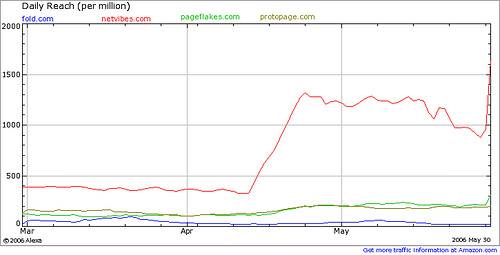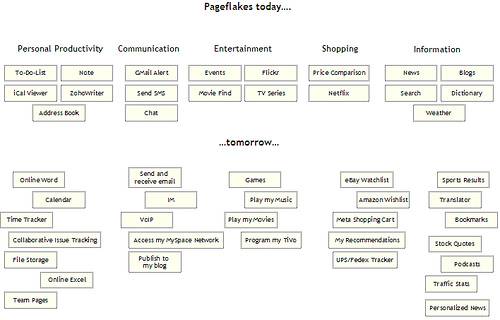Personalized Start Pages is a growing, but fiercely competitive, market. So what are
they? Predominantly they’re homepages for Web information, gadgets and widgets. The
difference from old-style web portals are: the user can personalize them much more (with
RSS, inline email, etc), the content is more interactive and potentially much more useful
(i.e. gadgets, widgets), they can be collaborative, and
there is Ajax pixie dust to make it more of a desktop-like experience.
As I’ve blogged
about before, the market has a lot of contenders. They fall into two main groups –
The Big Guns (Microsoft’s live.com, Google Personalized Homepage, My Yahoo) and The Little Companies (Netvibes, Protopage, PageFlakes, etc). Now, as Mike Arrington noted, the big list of
little companies is potentially starting to thin out:
“Well, the inevitable is starting to happen – a few new web startups are starting to
close up shop as they find that building an application is a lot easier than getting
users to try it out, and keep coming back. Fold.com, an
Ajax home page, has folded.”
Looking at the Alexa charts, it clearly shows Fold.com (the blue line hugging the
horizontal axis) never really got off the ground:

The chart also shows how successful Netvibes has been. This is also obvious from the Netvibes blog, which is chock full of new
feature announcements and lots of comments from passionate users.
Pageflakes and Protopage are another couple of contenders which are hanging in
there, to use Mike’s apt phrase. So what’s the business model of these start pages,
when all the big guns have their own start pages? Microsoft and Google are seemingly
putting a lot of stock into gadgets/widgets. Meanwhile Yahoo is happy enough (for now) to
continue to serve the mainstream audience – for which widgets are still a fair way off
being user-friendly.
I think there are still a lot of opportunities for the small companies. For example I
took a look at Pageflakes’ press kit and I was struck by this slide in particular:

It’s a little hard to see due to the width limitations of my site, but here’s a full-length
version. My point here is that Pageflakes, and I’m sure Netvibes and the others too,
are building up to a near future where gadgets/widgets will be much more plentiful and
functional. Basically these start pages are expecting the world of web services to
blossom in the next few years, which is my expectation too.
One key for the little companies is to persuade external developers to create
gadgets/widgets for their platforms. Pageflakes is an open platform, so I think it’s
got a great chance at succeeding in this strategy – as long as they can sell themselves
to that developer ecosystem. It currently claims 50% of their ‘flakes’ (i.e. gadgets) are
created by “Community Developers” and they say this figure is rising. Netvibes is
similarly well positioned – arguably better, because it has managed to get such a great
user/developer uptake so quickly.
In terms of growing the user base, I thought Peter Cooper made an excellent comment on
Techcrunch. After noting that Yahoo will likely keep hold of the mainstream crowd, Peter
said:
“If anything’s going to really break through, it’s going to be
Google’s (because of their sheer might), or something that appeals to the
MySpace/LiveJournal crowd (because of the sheer numbers and the way memes spread on
there). I dare say that MySpace could pull it off if they tried.”
(emphasis mine)
Peter’s right, the MySpace crowd will be highly attractive to start page companies.
It’s something which may potentially break this market wide open.
The other business model the likes of Netvibes and Pageflakes will pursue is the
enterprise market – and maybe even white-labelling. For example I happen to know that
one of the small companies mentioned above is exploring options as a ‘business portal’.
If start pages can integrate office apps like Writely and JotSpot into their pages (which
is already happening) and promote that to enterprises – that’s potentially a profitable
market.
So while it’s sad to see companies like Fold.com slip away, I don’t think this is any
reflection on the market itself for personalized start pages. In fact, I think it’s full
of opportunities – many of which may not clash with the plans of The Big Guns. And that’s
why Netvibes and Pageflakes have gotten funding. There is a future in their Personalized Start Pages, as long as they execute well.

















